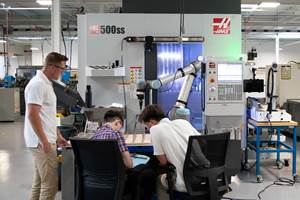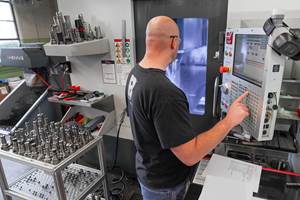Automation Can Have a Big Impact for Small Manufacturers
As automation shifts from optional to essential for small manufacturers, technology and industry events are shifting to meet these needs.
Share





There has been a shift in how the manufacturing industry thinks about automation. With no end in sight to the labor shortage, automation is becoming a necessity, especially for smaller manufacturers. Automation is no longer optional for these manufacturers. At the same time, technology is advancing so automation systems can become more productive and take on more tasks of increasing complexity. This supplement includes examples of this progress and how small manufacturers can use this technology now or will be able to in the near future.
The first article describes how 2D and 3D sensors enable Boston Dynamics’ Stretch robot to perform more complex tasks, such as unloading boxes from a trailer. Using data about the environment, the location of the boxes and the geometry of its own gripper and arm, Stretch can plan how to grab all the boxes without creating an avalanche.
Next is the story of MetalQuest Unlimited, a shop that implemented an automated cell with a 3D vision system so robots can pick castings from a box and orient them for machining. Bin-picking tasks such as this are more complex than picking from a tray or conveyor because of the change in Z-height as the box empties, and the robot’s need to maneuver around other parts and reach all four corners of the box. But a 3D vision system makes this possible.
Then, a feature from 91ÊÓƵÍøÕ¾ÎÛ Editor-in-Chief Brent Donaldson illustrates Renishaw Central, a closed-loop machining cell. It uses inspection data gathered from inside the cell to update tool offsets and variables, maintaining process control as it runs.
Finally, we have a story from Athena Manufacturing. This shop has found that a combination of machine and tool monitoring software ensures it is using its robotic cell and pallet systems as efficiently as possible.
But these aren’t just stories about technology — they’re about people as well. The earliest use case for Stretch involves unloading boxes from trailers, which can be hot, difficult working environments for humans. The bin-picking robotic cell with 3D vision system saves people from unloading boxes of heavy castings and placing them on a tray or conveyor, eliminating a source of repetitive-use injuries. And, at Athena Manufacturing – which is working towards an apprenticeship program despite implementing a variety of automation systems – the fabrication manager marvels at the quality of work its welding robots produce. Automation helps build and sustain a culture that enables shops to recruit new employees and retain the ones they have.
This shift is occurring in industry events as well. The Automation Sector, accelerated by SPS — Smart Production Solutions will make its debut at IMTS 2024. Located in the North Building, this area will feature companies that specialize in robots, cobots, motion control, data management and automation integration. This is in addition to the automation solutions traditionally found across the show floor in other sectors including machining, additive manufacturing, inspection, parts handling and cleaning and more.
An even more comprehensive look at automation is coming in 2025 with the debut of SPS Atlanta. This show is the result of a partnership between Mesago Messe Frankfort, producers of the annual SPS – Smart Production Solutions show in Nuremberg, Germany, and The Association for Manufacturing Technology (AMT), the producers of IMTS. Much like the German version of the show, SPS Atlanta will showcase the full range of automation technology, from discrete components to full intelligent solutions.
Small manufacturers are likely to have special needs when it comes to automation, including more flexible automation that can be adapted to a range of applications, or systems that work with machine tools shops already have. Spaces at events like these are dedicated to automation and can help small shops sort through the ever-increasing number of automation solutions and create a better environment to explore the topic, particularly for those new to automation.
Related Content
Increasing Productivity with Digitalization and AI
Job shops are implementing automation and digitalization into workflows to eliminate set up time and increase repeatability in production.
Read MoreCNC Machine Shop Honored for Automation, Machine Monitoring
From cobots to machine monitoring, this Top Shop honoree shows that machining technology is about more than the machine tool.
Read MoreSetting Up the Building Blocks for a Digital Factory
Woodward Inc. spent over a year developing an API to connect machines to its digital factory. Caron Engineering’s MiConnect has cut most of this process while also granting the shop greater access to machine information.
Read MoreMedical Shop Performs Lights-Out Production in Five-Axes
Moving to five-axis machining enabled this shop to dramatically reduce setup time and increase lights-out capacity, but success relied on the right combination of workholding and automation.
Read MoreRead Next
Machine Shop MBA
Making Chips and 91ÊÓƵÍøÕ¾ÎÛ are teaming up for a new podcast series called Machine Shop MBA—designed to help manufacturers measure their success against the industry’s best. Through the lens of the Top Shops benchmarking program, the series explores the KPIs that set high-performing shops apart, from machine utilization and first-pass yield to employee engagement and revenue per employee.
Read MoreAMRs Are Moving Into Manufacturing: 4 Considerations for Implementation
AMRs can provide a flexible, easy-to-use automation platform so long as manufacturers choose a suitable task and prepare their facilities.
Read MoreLast Chance! 2025 Top Shops Benchmarking Survey Still Open Through April 30
Don’t miss out! 91ÊÓƵÍøÕ¾ÎÛ's Top Shops Benchmarking Survey is still open — but not for long. This is your last chance to a receive free, customized benchmarking report that includes actionable feedback across several shopfloor and business metrics.
Read More






















